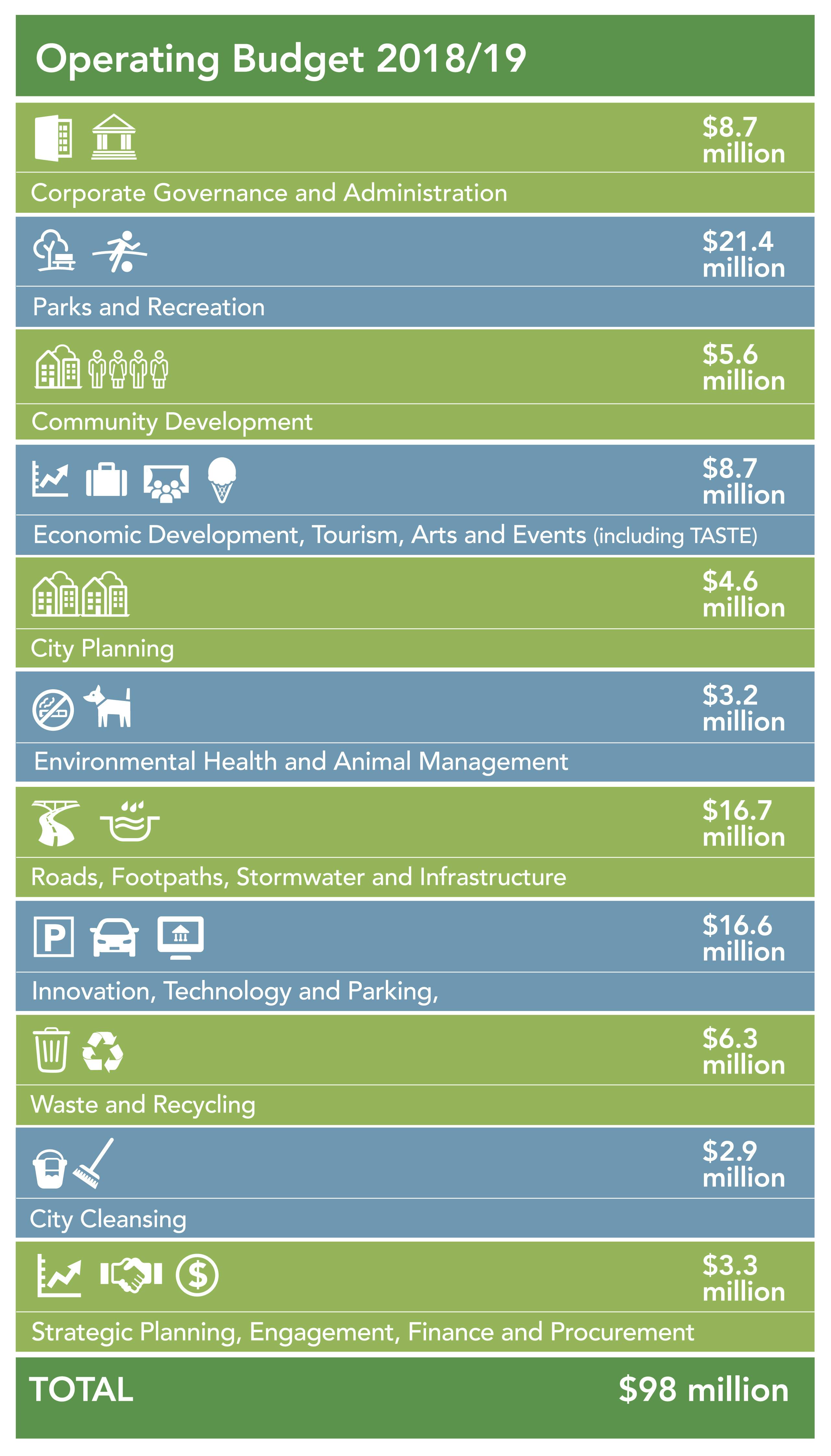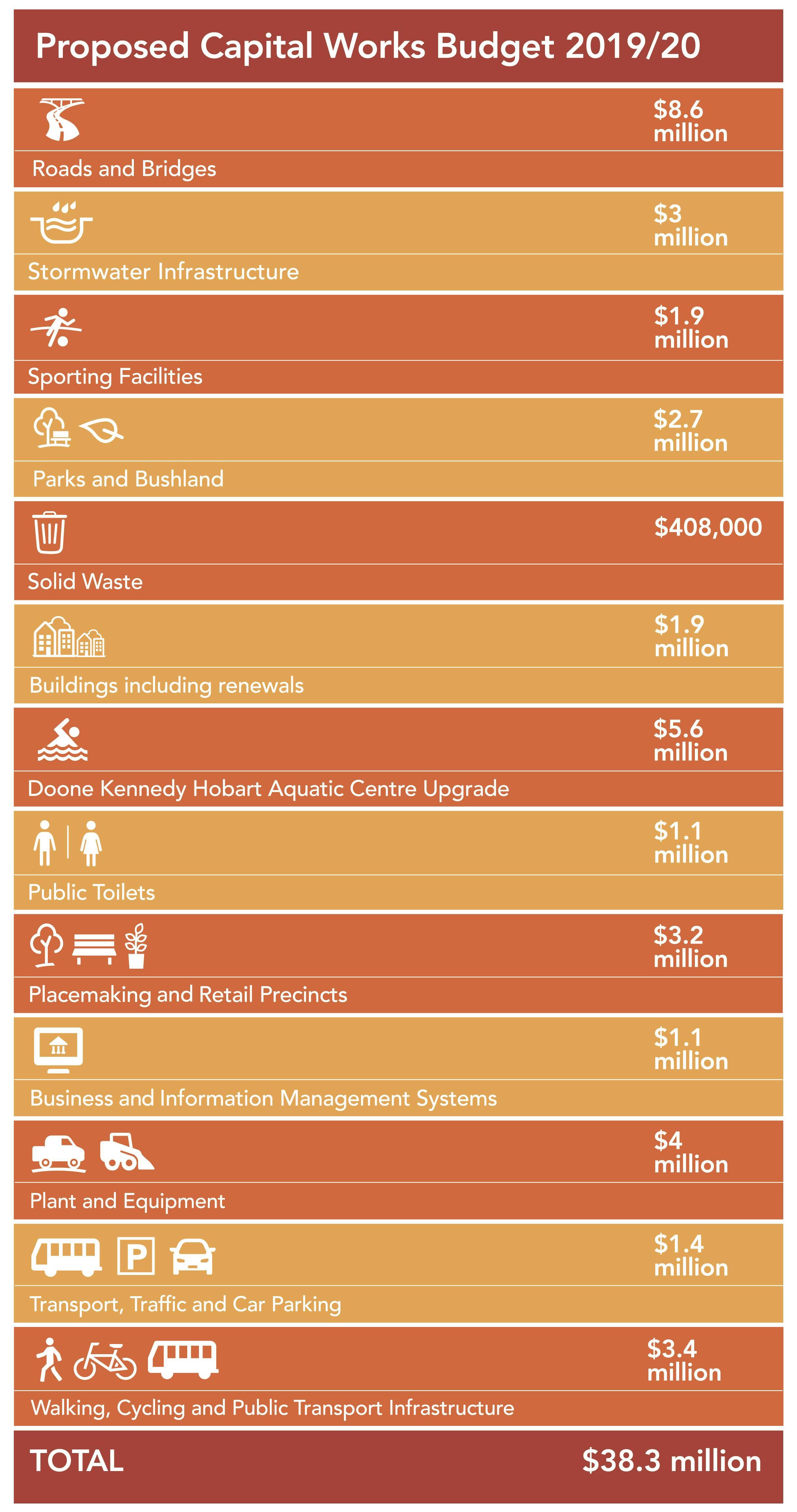The City of Hobart manages and maintains an extensive network of parks,
gardens, bushland reserves, sports fields, recreational facilities and
streetscapes.
This includes:
- management of Hobart’s unique natural and
cultural heritage bushland
- services, recreational facilities and
programs, including the Bush Adventures program and Bushcare volunteer
program
- Doone Kennedy Hobart Aquatic Centre
- maintenance of 130 parks and reserves,
including 48 playgrounds,19 sports fields, BBQ's and picnic shelters
- operating an industry-accredited nursery to
grow trees, shrubs and seedlings
- management of walking and cycling tracks
- management of the City's public toilet
networks
- 18,000 street trees
- fire protection of the city.
The City of Hobart delivers services and programs for older people,
young people, children and families, people with disabilities and people from
culturally and linguistically diverse backgrounds.
We are responsible for community facilities, including the Youth Arts
and Recreation Centre and Mathers House, as well as neighbourhood halls. A
major part of our work is delivering a community grants program to fund
projects, services and events, organise citizenship ceremonies and has a key
role in delivering community safety projects.
Economic development seeks to engage with business; facilitate quality development and investment; support the retail sector; attract students and international visitors, and contribute to the economy through international relationships.
Tourism and major events
These functions promote Hobart as a destination of choice for tourism, as well as contributing to a more vibrant and active city for residents.
They include the Tasmanian Travel and Information Centre in Hobart, Salamanca Market, and the annual Taste of Tasmania.
Image credit: Natasha Mulhall
The animal management program is responsible for dog licensing and control. Activities include dog registrations, applications for kennel licences, investigation and action on complaints about barking dogs, roaming animals or dog attacks.
The environmental health program provides inspection and assessment services to protect public health and includes the following activities:
- food safety
- noise nuisance management
- disease prevention and control
- public health education and promotion
- assessment of applications for public gatherings such as festivals
- unhealthy premises
- cooling towers and warm water systems
- public health risk activities
- administering school and community immunisations programs
- exhumations
- onsite waste water management
- recreational and bathing water quality
- responding to public and environmental health complaints
- air, water and land pollution
- smoke-free public places
The City is responsible for maintaining roads and footpaths and traffic management.
The road and footpath network includes:
- more than 280 kilometres of sealed roads
- over 5 kilometres of unsealed roads
- more than 425 kilometres of footpaths
- 67 bridges.
The City's inspection program identifies hazards, such as uneven footpath surfaces, damaged signs, potholes and trees overhanging the footpath.
The City also owns and manages more than 339 kilometres of stormwater mains, more than 550 other stormwater assets such as kerb and gutters, and 60 kilometres of rivulets and creeks.
An in-house design and project management unit supports the Transforming Hobart 10 year capital works program.
Hobart is at a significant tipping point in its history. Local government is increasingly being asked to consider both local and global change, responding to what’s happening now and planning for what could happen in the future.
Innovation will allow our city to improve and enhance the way we sense and respond to, then predict and act on, today’s challenges – and those awaiting us in the future – across areas as diverse as public safety, security, lighting, transport, energy, parking, signage, information and communication assets and services.
The City manages parking on public streets in the Hobart city centre and suburban areas, as well as multi-storey car parks placed in strategic locations throughout the city centre offering over 2300 parking spaces. Expediture indicated in the Budget Information Sheet is offset by parking revenue.
Waste is collected weekly and recyclables and green waste are collected fortnightly. In total, the City of Hobart has more than 1.5 million bin collections every year. The City is also responsible for:
•emptying public litter bins
•managing the McRobies Gully Waste Management Centre,
•working to improve waste management
•recycling unit for difficult to recycle items
•waste education activities.
The City has a comprehensive cleaning regime to prevent pollution,
maintain clean public spaces and reduce public health risks.
Sweeping streets, footpaths and other paved areas is a vital frontline
operation in preventing leaves, cigarette butts, litter, drink cans, bottles
and debris entering our waterways and catchments.
All City of Hobart streets and footpaths are cleaned regularly, with
street sweepers travelling around 3000 kilometres per month.
City cleansing is also responsible for all our public toilets, sporting
facility change rooms and removing graffiti.













